One of the biggest stories of the year here in the U.S. was the massive oil spill in the Gulf of Mexico over the summer. The long-term environmental and economic impact of such a terrible accident remains to be seen though previous major spills have led to some notable damage.
The following CNN video looks at the aftermath of the 1979 Ixtec I oil spill off the Yucatan Peninsula. Tar balls from the estimated three billion barrels of crude can still be found on the islands near the Mexican mainland while mangrove forests in Campeche are under risk from clumps of oil.
Online Sources - CNET News
Video Source - CNN
The English-language forum for all things Latin American, covering business, politics, and culture.
Saturday, December 4, 2010
Weekend Headlines: December 4-5, 2010
 * Mexico: Did police behave “completely inappropriately” by exhibiting a presumed 14-year-old hitman in front of the assembled press?
* Mexico: Did police behave “completely inappropriately” by exhibiting a presumed 14-year-old hitman in front of the assembled press?* Cuba: A court commuted the sentence of a Salvadoran man convicted of killing an Italian tourist during a series of bombings approximate twelve years ago.
* Chile: At least two dozen people were injured after police clashed with Easter Island locals over land rights.
* Venezuela: The death toll attributed to heavy rains and increased flooding has risen to 31 according to the government.
Image – ITN (A 14-year-old nicknamed "El Ponchis" allegedly killed four people on orders of a Mexican drug gang.)
Online Sources- Reuters, TVNZ, CNN, El Universal
Friday, December 3, 2010
Today’s Video: Is it worth it?
We'll be back this weekend to cover several non-Wikileaks stories from the past few days possibly including allegations of discrimination against Latino farmers and the difficulties faced by Mexico's disabled population.
In the meantime the following video from the Associated Press examines some of the pitfalls in the "war on drugs" such as how most of those arrested in drug busts are small fish while the cartels' bosses are generally untouched.
Are the U.S. counternarcotics efforts successful or not? Please let us know what you think by leaving a comment to this post.
Video Source - YouTube
In the meantime the following video from the Associated Press examines some of the pitfalls in the "war on drugs" such as how most of those arrested in drug busts are small fish while the cartels' bosses are generally untouched.
Are the U.S. counternarcotics efforts successful or not? Please let us know what you think by leaving a comment to this post.
Video Source - YouTube
World Watch: Whose presidency is it anyway?
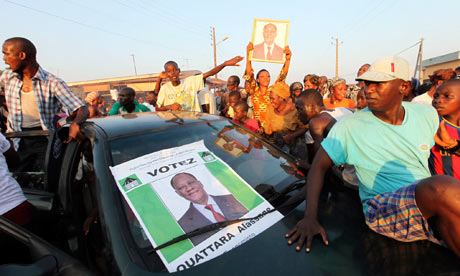 * Africa: Ivory Coast officials are divided as to who won last week’s presidential elections while tensions continue in Guinea after opposition leader Alpha Conde was declared as president-elect.
* Africa: Ivory Coast officials are divided as to who won last week’s presidential elections while tensions continue in Guinea after opposition leader Alpha Conde was declared as president-elect.* India: As the 26th anniversary of the Bhopal industrial disaster approaches, some victims are seeking $1.1 billion in compensation from Dow Chemicals.
* World: According to a new survey released by Pew Research Center most Muslims in countries with large Islamic populations rejected Al Qaeda as well as the tactic of suicide bombings.
* Spain: An increased tobacco tax and pension reforms could be the next steps to strengthen an already weakened Spanish economy.
Image – Luc Gnago/REUTERS via The Guardian (“Supporters of opposition leader Alassane Outtara in the city of Gagnoa, Ivory Coast. The president's camp alleges vote rigging.”)
Online Sources- Bloomberg, Reuters, BBC News, CNN
De Musica Ligera: Feliz Hanukkah! (Again)
Tonight is the fifth evening in the Jewish holiday of Hanukkah.
Judaism has had a strong (albeit understated) history in Latin America. Jewish immigrants from Europe were part of a strong "colonization" push in the late 1800s and early 1900s in Argentina, for instance. Hundreds of thousands of Jews escaping the Holocaust during World War II were provided safe haven in Latin American countries like Brazil, Costa Rica and the Dominican Republic. Though some Jewish leaders in the region claimed that there has been an uptick in anti-Semitism, Latin America's Jewish community continues to thrive.
In honor of the eight-day "Festival of Light", the following video is from the extraordinary group Hip Hop Hoodios. "Ocho Kandelikas" is a song that we featured last year and, is a unique take on the Hanukkah festivities. Enjoy!
Online Sources - The Latin Americanist, CSMonitor.com, United States Holocaust Memorial Museum
Video Source - YouTube
Judaism has had a strong (albeit understated) history in Latin America. Jewish immigrants from Europe were part of a strong "colonization" push in the late 1800s and early 1900s in Argentina, for instance. Hundreds of thousands of Jews escaping the Holocaust during World War II were provided safe haven in Latin American countries like Brazil, Costa Rica and the Dominican Republic. Though some Jewish leaders in the region claimed that there has been an uptick in anti-Semitism, Latin America's Jewish community continues to thrive.
In honor of the eight-day "Festival of Light", the following video is from the extraordinary group Hip Hop Hoodios. "Ocho Kandelikas" is a song that we featured last year and, is a unique take on the Hanukkah festivities. Enjoy!
Online Sources - The Latin Americanist, CSMonitor.com, United States Holocaust Memorial Museum
Video Source - YouTube
Daily Headlines: December 3, 2010
 * Argentina: Diplomatic tensions between Argentina and Britain could reignite over the finding of a new offshore oil field near the disputed Falkland Islands.
* Argentina: Diplomatic tensions between Argentina and Britain could reignite over the finding of a new offshore oil field near the disputed Falkland Islands.* Latin America: According to two more communiqués divulged by Wikileaks former Colombian president Alvaro Uribe “almost came to blows” with Venezuelan leader Hugo Chavez at a summit in February while a State Department cable expressed deep doubts over Mexican antidrug efforts.
* Mexico: Police arrested a key member of the Zetas drug gang, a “regional leader” accused of smuggling millions of dollars worth of drugs into the U.S.
* Costa Rica: President Laura Chinchilla said that she would send more police to the border with Nicaragua as part of a heated border dispute between both countries.
Image – BBC News (The chairman of British firm Desire Petroleum told BBC News that the finding of a new Falklands offshore oil field is "highly encouraging.")
Online Sources- Bloomberg, The Guardian, Voice of America, The Tico Times
Thursday, December 2, 2010
World Watch: Hot hot heat
 * World: 2010 could be “one of the three warmest years on record” according to data released by the World Meteorological Organization at a climate change conference in Cancun, Mexico.
* World: 2010 could be “one of the three warmest years on record” according to data released by the World Meteorological Organization at a climate change conference in Cancun, Mexico.* Israel: At least forty prison guards died as a result of a raging forest fire in northern Israel.
* Nigeria: Authorities plan to charge former U.S. Vice President Dick Cheney in a $180 million bribery case allegedly involving energy firm Halliburton.
* India: India will supposedly buy billions of dollars worth of arms from Russia and France as part of a “military modernization” plan.
Image – Mikhail Metzel/Associated Press via CBC (“Fading sunflowers droop in a field in Voronezh region, some 415 km south of Moscow, after weeks of searing heat and practically no rain during the summer of 2010. A severe drought destroyed one-fifth of the wheat crop in Russia, the world's third-largest exporter of the grain.”)
Online Sources- MSNBC, BBC News, The Guardian, Voice of America
Today’s Video: Prevention (revisited)
Yesterday on World AIDS Day we featured a video on the members of an El Salvadoran charity determined to prevent the spread of AIDS among the LGBT population. In Chile another form of prevention has taken place albeit in a ruthless manner. In the video report from Al Jazeera below, several HIV-positive women alleged that they were forcibly sterilized after giving birth. The women have taken their case to an Organization of American States-related judicial body, but it will be very difficult to erase the mental and physical scars these women have.
Online Source - The Latin Americanist
Video Source - YouTube
Online Source - The Latin Americanist
Video Source - YouTube
Daily Headlines: December 2, 2010
* Brazil: A judge permitted clown-turned-comedian Francisco Everardo Oliveira Silva “Tiririca” to take office in the Chamber of Deputies after he received over 1.3 million votes in October.
* Venezuela: A state of emergency was declared nationwide after heavy rains and flooding killed at least 29 people.
* Guatemala: The government will auction off the exploration rights of oil fields in the north to foreign oil firms.
Image – Reuters/David Gray/Files via Reuters (“A small house can be seen in front of a coal-burning power station located on the outskirts of Beijing August 17, 2009.”)
Online Sources- Reuters, MSNBC, The Latin Americanist, MSNBC, LAHT
Wednesday, December 1, 2010
World Watch: Taking a chance
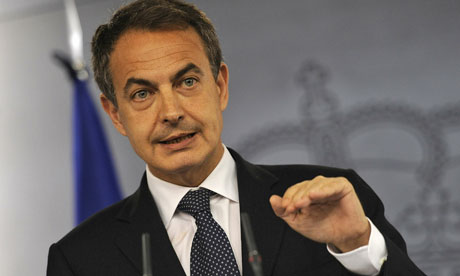 * Spain: Prime Minister José Luis Rodríguez Zapatero announced that he would skip attending the Ibero-American Summit and suggested that the government could privatize the “El Gordo” Christmas lottery.
* Spain: Prime Minister José Luis Rodríguez Zapatero announced that he would skip attending the Ibero-American Summit and suggested that the government could privatize the “El Gordo” Christmas lottery.* Egypt: The main opposition parties will boycott the runoff of legislative elections after they accused the ruling NDP of widespread electoral fraud.
* Iran: The eight-year human rights campaign to save the life of Shahla Jahed took a turn for the worse after she was executed for adultery.
* U.S.: Former U.S. Secretary of State Colin Powell is pushing Congress to back the START nuclear treaty with Russia as soon as possible.
Image – Dani Pozo/AFP/Getty Images via The Guardian (“José Luis Rodríguez Zapatero said today that up to 30% of El Gordo would be sold off.”)
Online Sources- Reuters, MSNBC, The Telegraph, The Guardian
Ecuadorian president denies Wikileaks offer
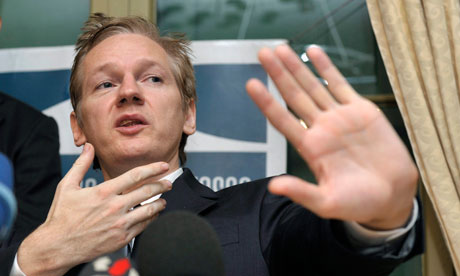 The fallout from the Wikileaks document dump continues with several new diplomatic cables revealed in the past 24 hours. Before getting to some of them, however, it’s worth noting an unusual aside in this already unusual story.
The fallout from the Wikileaks document dump continues with several new diplomatic cables revealed in the past 24 hours. Before getting to some of them, however, it’s worth noting an unusual aside in this already unusual story.According to media reports yesterday WikiLeaks founder and chief Julian Assange would be permitted safe haven in the South American country of Ecuador. Deputy Foreign Minister Kintto Lucas allegedly told the local press that the controversial figure would be permitted to speak and ply his trade freely in Ecuador. “We are open to giving him residency in Ecuador, without any problem and without any conditions," said Kintto according to the BBC News.
Last night, however, Ecuadorian president Rafael Correa rejected inviting Assange to his country. "Kintto Lucas's quoted comment was a spontaneous, personal response to a question from a local journalist and garnered attention due to the high international interest in the WikiLeaks story," read part of a statement from the Ecuadoran embassy in Washington.
So what other documents has Wikileaks recently revealed and related to Latin America? Here’s a sample:
- A 2006 State Department cable alleged that Cuban intelligence officers advise Venezuelan President Hugo Chavez. The cheekily titled "Cuba/Venezuela Axis of Mischief: The view from Caracas, also implied that Chavez trusts Cuban intelligence more than the security apparatus in his own country.
- A 2009 note from U.S. diplomats in Havana claimed that the Cuban government provided “refuge” to members of the Basque separatist group ETA as well as Colombian guerillas. Nonetheless, the cable noted, “there’s a slim probability that they are conducting terrorist operations from Cuba.”
- Brazilian Defense Minister Nelson Jobim denied allegations in a leaked 2008 cable that said that he believed that a deputy foreign minister at the time “hates the United States.” Another note on Jobim claimed that he was upset at the “imprudence” shown by the U.S. by not seeking regional support for its controversial plan to expand its military presence in Colombia.
Peruvian president Alan Garcia, who has a famously sharp tongue, has already dismissed the Wikileak cables as only “gringos’” opinions and therefore, while embarrassing, “totally irrelevant”…Image- Martial Trezzini/EPA via The Guardian (“WikiLeaks founder Julian Assange now faces calls from some quarters in the US for his arrest and extradition on espionage charges.”)
As Luiz Inácio Silva da Lula, the Brazilian president, said on Tuesday: “The things I have seen about Brazil are so insignificant they don’t deserve to be taken seriously.”
Online Sources- Too many to list!
Today’s Video: Prevention
Today is World AIDS Day and Latin America and the Caribbean (LAC) have certainly not been immune from the effects of the deadly pandemic. According to international AIDS charity Avert over two million people in the region are hit with HIV, "more than in the U.S., Canada, Japan and the UK combined." Furthermore, Avert's comprenhensive analysis of HIV/AIDS in LAC found that certain groups, such as sex workers and migrants are more susceptible to the disease than others.
Worse is that there may be a problem with funding to prevent AIDS as the former director of the U.N.'s AIDS program told Bloomberg. “There is clearly AIDS fatigue,” said Peter Piot who also noted that funding needs to be more selective:
Online Sources - Avert, Bloomberg
Video Source - YouTube
Worse is that there may be a problem with funding to prevent AIDS as the former director of the U.N.'s AIDS program told Bloomberg. “There is clearly AIDS fatigue,” said Peter Piot who also noted that funding needs to be more selective:
“In Latin America, for example, most HIV-prevention programs are directed towards the general public, people who are not at high risk and there is not much going on in the gay community where the problem is,” said Piot. “That’s a waste of money then. My mother doesn’t need HIV prevention, she’s 87.”Not all is doom and gloom regarding HIV/AIDS prevention in LAC. Take the case of Entre Amigos (Among Friends), a Salvadoran charity aimed at the country's LGBT community. Their work has been invaluable in trying to remove the stigmas related to HIV/AIDS as well as homosexuality:
Online Sources - Avert, Bloomberg
Video Source - YouTube
Daily Headlines: December 1, 2010
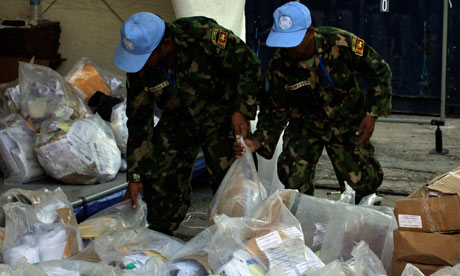 * Haiti: International observers downplayed allegations of massive electoral fraud yet acknowledged “rampant disorganization.”
* Haiti: International observers downplayed allegations of massive electoral fraud yet acknowledged “rampant disorganization.”* Latin America: According to the Economic Commission for Latin America and the Caribbean poverty throughout the region will decrease as a sign of bouncing back from the global economic downturn.
* Panama: The U.S. and Panama signed a “tax-information exchange agreement” that could ease the path to a free trade pact.
* Venezuela: At least twenty-one people are dead as a result of landslides and flooding caused by torrential rains.
Image – Eduardo Munoz/Reuters via The Guardian (“UN soldiers from Sri Lanka at the Haitian election tabulation center in Port-au-Prince. The elections ended in confusion as 12 of the 18 presidential candidates denounced 'massive fraud' although international observers say the eventual result will stand.”)
Online Sources- MSNBC, Reuters, Bloomberg, Toronto Sun
Tuesday, November 30, 2010
World Watch: File not found
 * World: While plenty of attention has been paid to the thousands of documents revealed by WikiLeaks, the Internet site was briefly knocked out for a second straight day from a DDOS attack.
* World: While plenty of attention has been paid to the thousands of documents revealed by WikiLeaks, the Internet site was briefly knocked out for a second straight day from a DDOS attack.* Africa: Libyan leader Moammar Gadhafi blasted the WTO, World Bank, and the U.N. at the opening of the third African Union-European Union Summit in Tripoli.
* Kenya: Gay rights activists are none too pleased with allegedly homophobic remarks by Prime Minister Raila Odinga.
* Europe: The wild winter weather hit Spain and Portugal where numerous roads and schools were closed and flights were delayed.
Image – The Hindu (“Screenshot of WikiLeaks' twitter page.”)
Online Sources- CSMonitor.com, Voice of America, CNN, MSNBC
Today’s Video: Going green
 From the pioneering bus rapid system in Curitiba, Brazil to the ciclovia bicycle-riding paths of Bogota, Colombia numerous environmentally-friendly projects have gone into effect in several Latin American urban centers. The megalopolis that is Mexico City has not been an exception as the government of mayor Marcelo Ebrard has promoted a novel bike-sharing program. The idea has not been without its detractors such as some cyclists who feel that bike safety has taken a back seat. But with a major environmental conference currently under way in Cancun, the "Green Plan" could be another successful program in Latin America.
From the pioneering bus rapid system in Curitiba, Brazil to the ciclovia bicycle-riding paths of Bogota, Colombia numerous environmentally-friendly projects have gone into effect in several Latin American urban centers. The megalopolis that is Mexico City has not been an exception as the government of mayor Marcelo Ebrard has promoted a novel bike-sharing program. The idea has not been without its detractors such as some cyclists who feel that bike safety has taken a back seat. But with a major environmental conference currently under way in Cancun, the "Green Plan" could be another successful program in Latin America.Much like this entry on Peru, the video cannot be embedded but the link to the brief clip is included below:
Online Sources - Reuters, The Latin Americanist, Wikipedia, Urban Habitat
Video Source - AFP via YouTube
Image - El Economista
Daily Headlines: November 30, 2010
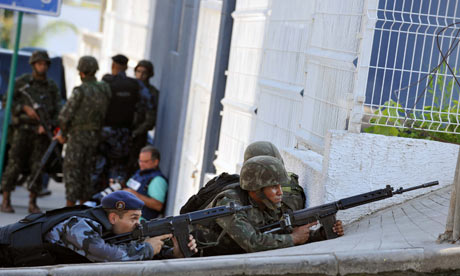 * Brazil: President Luiz Inacio Lula da Silva praised police and the army for their crackdown on drug gangs in Rio de Janeiro.
* Brazil: President Luiz Inacio Lula da Silva praised police and the army for their crackdown on drug gangs in Rio de Janeiro.* U.S.: Could the “Tequila Party” become the next burgeoning U.S. political movement?
* Central America: Panama and Costa Rica launched a health program to combat the spread of malaria along the border between both countries.
* Mexico: Troops uncovered eighteen bodies buried in a Chihuahua ranch near the border with Texas.
Image – KeystoneUSA-ZUMA/Rex Features via The Guardian (“Security forces were deployed to a poor area of Rio de Janeiro to tackle a wave of gang violence.”)
Online Sources- BBC News, UPI, MSNBC, Xinhua
Monday, November 29, 2010
World Watch: Barca blitz
 * Spain: The latest edition of the Spanish clasico turned into a 5-0 walk in the park for FC Barcelona over bitter rivals Real Madrid.
* Spain: The latest edition of the Spanish clasico turned into a 5-0 walk in the park for FC Barcelona over bitter rivals Real Madrid.* Egypt: Hundreds of protesters took to the streets of Cairo to demonstrate against alleged voting irregularities.
* Asia: According to the Japanese press representatives of that country, South Korea, and the U.S. will meet next week to discuss the crisis on the Korean peninsula.
* Switzerland: First it was banning the construction of new minarets, and now Swiss voters backed a referendum measure to expel foreigners convicted of serious crimes.
Image – Andreu Dalmau/EPA via The Guardian (“David Villa celebrates after scoring his second and Barcelona's fourth against Real Madrid.”)
Online Sources- Voice of America, Reuters, Christian Science Monitor, CNN
LatAm targeted in Wikileaks document dump (updated)
 By now perhaps you’ve heard about Sunday’s dump of a reported 250,000 diplomatic documents by the Wikileaks website. The press has concentrated on the release of cables showing U.S. relations with leaders in Europe and the Middle East. But several Latin American heads of state and topics were not exempt from the action deemed by U.S. Secretary of State Hillary Clinton as an "attack on the international community".
By now perhaps you’ve heard about Sunday’s dump of a reported 250,000 diplomatic documents by the Wikileaks website. The press has concentrated on the release of cables showing U.S. relations with leaders in Europe and the Middle East. But several Latin American heads of state and topics were not exempt from the action deemed by U.S. Secretary of State Hillary Clinton as an "attack on the international community".- Honduras: Perhaps the most damaging leaked documents pertaining to Latin America have to do with the 2008 ouster of then-Honduran president Manuel Zelaya. "No matter what the merits of the case against Zelaya, his forced removal by the military was clearly illegal, and (de facto leader Roberto) Micheletti's ascendance as 'interim president' was totally illegitimate," according to a communiqué from Ambassador Hugo Llorens. The memo, which was emitted less than a month after Zelaya was forced into exile by the military, somewhat contradicts the official State Department measured response. In addition, as Daniel Altschuler wrote in the Americas Quaterly:
The leaked analysis by the embassy offers such a systematic rejection pro-coup case, but it was never advanced publicly. Had the administration made public such an assessment of the Honduran coup—and its implicit rejection of the LLC (Law Library of Congress) report—it would have provided a useful tool for refuting the spurious arguments made by conservatives. Instead, as summer 2009 drew to a close, the position that the coup was a defense of the rule of law gained traction inside the Beltway.
- Venezuela: U.S. diplomats attempted to isolate President Hugo Chávez from his Latin American neighbors acceding to some of the over 2300 leaked documents on Venezuela. One French official in a 2009 communiqué called Chavez “crazy” and claimed that he was "taking one of Latin America's richest countries and turning it into another Zimbabwe." (French officials have yet to confirm such a scathing critique).
- Argentina: Speaking of “crazy” the mental state of Argentine President Cristina Fernandez was the focus of one memo by Secretary Clinton who implied that she may not have been on the ball. (2200 memos were leaked from Buenos Aires, third highest among Latin American states).
- Guantanamo: Trying to convince foreign countries to accept detainees of the prison at Guantanamo turned into a diplomatic game of “Let’s Make a Deal.” “Slovenia was told to take a prisoner if it wanted to meet with President Obama,” according to the New York Times while millions of dollars worth of incentives were offered to the Asian-Pacific country of Kiribati in exchange for taking in Chinese Muslim detainees.
- Colombia: The Latin American country with the most leaked docs from Wikileaks with over 2400 cables. Oddly enough, however, none of the newspapers with access to the docs on Colombia have revealed the content of the leaked cables. That didn’t stop Colombia’s foreign minister from doing some damage control and claiming that the Wikileaks dump is exclusively “a U.S. problem.”
- Panama: As the saying goes “hindsight is 20/20.” According to a leaked 1989 memo a U.S. diplomat called then-Panamanian leader Manuel Noriega “a master of survival”. Days later Noriega would be ousted in a U.S.-led military invasion.
- South America (Update): Bolivian authorities claimed that the Wikileaks document disclosure proved that the U.S. "spied" on Bolivia via the Drug Enforcement Administration and the Agency for International Development. Other leaked documents showed that Brazil was reluctant to participate in the U.S.-led "war on terror", and instead opted to focus on drug trafficking and money laundering.
Online Sources- Too many to list!
Today’s Video: Considering the DREAM Act
To DREAM or not to DREAM, that is the question.
Last month we looked at the "Don’t Be a Douchebag, Vote" campaign by Cuentame, a group run under the auspices of the Brave New Foundation. Their latest effort is to push for Congressional approval of the DREAM Act, a proposal that would permit a path to citizenship for certain illegal immigrants either fighting in the military or seeking post-secondary education.
Opponents of the plan, which may be debated during the current "lame-duck" period of Congress, claim that it provides an unfair "amnesty" for undocumented migrants. Backers of the proposal believe, on the other hand, that rightfully rewards hard-working young men and women seeking to better their lives as well as their communities.
As noted in the Los Angeles Times, those eligible under the DREAM Act must meet a number of very strict guidelines in order to be granted conditional legal residency:
Online Sources - Chicago Daily Herald, The Latin Americanist, Los Angeles Times
Video Source - Cuentame's Facebook site
Last month we looked at the "Don’t Be a Douchebag, Vote" campaign by Cuentame, a group run under the auspices of the Brave New Foundation. Their latest effort is to push for Congressional approval of the DREAM Act, a proposal that would permit a path to citizenship for certain illegal immigrants either fighting in the military or seeking post-secondary education.
Opponents of the plan, which may be debated during the current "lame-duck" period of Congress, claim that it provides an unfair "amnesty" for undocumented migrants. Backers of the proposal believe, on the other hand, that rightfully rewards hard-working young men and women seeking to better their lives as well as their communities.
As noted in the Los Angeles Times, those eligible under the DREAM Act must meet a number of very strict guidelines in order to be granted conditional legal residency:
The Dream Act would give legal residency to immigrants who arrived before the age of 16, resided in the U.S. for at least five years, graduated from high school and completed two years of college or honorable military service. They would be subject to background checks and could not have a criminal record. Even if granted residency, they would not be eligible for federal grant scholarships. When enacted, the law would apply to those under 35.The following video from Cuentame is part of today's national day of action in support of the DREAM Act. Decide for yourself if this piece of legislation should be passed or defeated:
Online Sources - Chicago Daily Herald, The Latin Americanist, Los Angeles Times
Video Source - Cuentame's Facebook site
Daily Headlines: November 29, 2010
 * Haiti: Twelve of Haiti’s presidential candidates have called for yesterday’s elections to be cancelled amidst allegations of “massive fraud” and disenfranchisement of thousands of voters
* Haiti: Twelve of Haiti’s presidential candidates have called for yesterday’s elections to be cancelled amidst allegations of “massive fraud” and disenfranchisement of thousands of voters* Cuba: According to Cardinal Jaime Ortega the Cuban government will release the last of a group of political prisoners detained in a 2003 dissident crackdown.
* Mexico: Authorities arrested a suspected drug gang hit man said to be responsible for four out of five murders in Ciudad Juarez.
* Chile: The strike at the Collahuasi copper mine has entered its third week with talks between management and workers expected to resume today.
Image – Eduardo Munoz/Reuters via CSMonitor.com (“A Haitian walks over ballots on the floor after frustrated voters destroyed electoral materials during a protest at a voting center in Port-au-Prince, Sunday. Twelve out of Haiti's 19 presidential candidates denounced 'massive fraud' in Haiti elections and demanded the vote be canceled.”)
Online Sources- Bloomberg, CNN, monstersandcritics.com, Voice of America